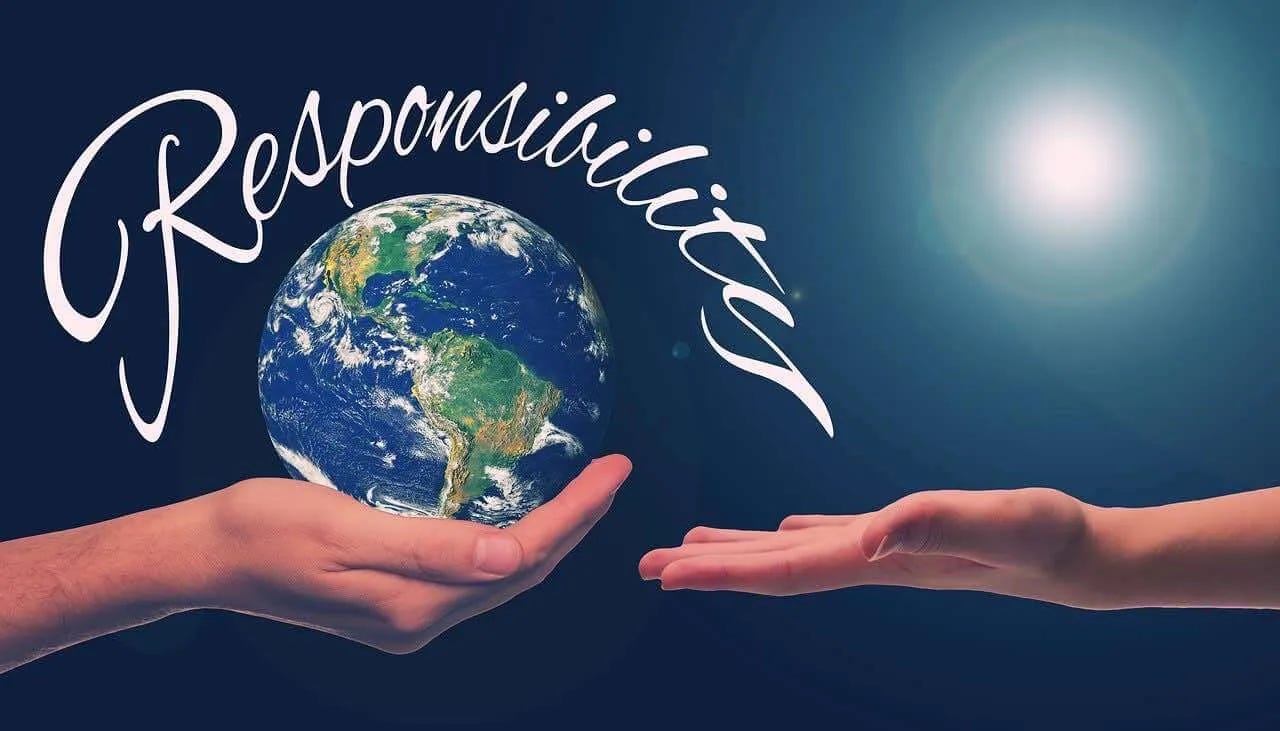Response-ability
What does it mean to be responsible? There are many answers but by the word itself i defer to response-ability. In other words, the ability to respond to any situation in a rightwise fashion, the appropriate response that suits the situation of the moment and not just some textbook answer or what a websearch tells you to do.
If i pay my bills on time, call my friends and family routinely, do my job, etc., but then panic and don't know what to do about a sudden unusual situation, does that me make a responsible person? Responsible by societal standards, yes, but not with regard to think on your feet spontaneously response-ability; and that is something sorely lacking with much of today's programmed by news-feeds, god-in-a-gadget consciousness.
Responsibility is also living up to one's half of the deal. If i ask you to do such and such by such and such a date and you agree, but don't, while also failing to inform me of such, that would be irresponsible.
Responding is also known for being a wiser choice than reacting because the latter is typically laced with emotional baggage
Some responsibilities come with an agreed upon and some with a natural expectation, as with family and friends; when you simply care about someone, you are continually responsible. Lovingly living up to one's half of the deal of an ongoing back-and-forth brings to mind the call and response of Kirtan, an East Indian sacred and devotional form of chanting.
As human beings, we are also responsible for places and non-human beings, such as water. In a bigger socio-cultural context, I have often heard Natives speak about responsibilities rather than rights, taking responsibility/being responsible rather than relying on rights being given to you by the “system of domination,” as Steven T. Newcomb refers to it. While, for example, “rights of nature” may help protect a local body of water, while you are waiting months, years, maybe never for the government/legal system to grant such rights, you could already have taken on the responsibility to do something to protect that body of water.
Americans think they are cool because of the right to free speech but why can't i simply speak my heart-mind? Why do i need a government to give me that right? Right or no right i will continue speaking my heart-mind — just that nowadays, and historically, one has to be careful where and how because the powers that do too much don't like it when people say things that run counter to their narrative, thus voices can be squelched or, to the extreme, thrown in jail and deprived of basic human rights aka simply being respectable to someone because of being a fellow human being. I think of Julian Assange, imprisoned and virtually tortured for the crime of journalism, for exposing truths that the powers that do too much don't want too many people to know because then their game would be up, their manipulative mind-control gig of destruction and domination rendered kaput, their power to dole out rights to good citizen beggars usurped. That said, rights are not to be totally overlooked. As example, check out a little book, about the Kanaka Maoli, that fits in the palm of a hand, Our Rights to Self-Determination: A Hawaiian Manifesto by Anne Keala Kelly.
For a further clue as to the homegrown response-ability kit, back to the word itself; a response is a re-sponse, so what's a “sponse” that we “re”
(go back again) to? From “spondere”, “give assurance, promise solemnly," from Proto-Italic *spondejo- "to pledge," literally "to libate many times," from *spondeio- "to libate" (source also of Hittite ishpanti- "to bring a fluid sacrifice, pour;" Greek spendein "make a drink offering," spondē "libation, offering of wine;" compare “spondee”.)
In poetic form, a spondee is a "metrical foot consisting of two long syllables," for example “long haul.” Yet more significantly, “Greek spondeios, the name of the meter originally used in chants accompanying libations, from spondē "solemn libation, a drink-offering," related to spendein "make a drink offering," from root *spend- "to make an offering, perform a rite," hence "to engage oneself by a ritual act" (source also of Latin spondere "to engage oneself, promise.")” (etymonline.com)
You can make of all that what you will, but the gist to me is the sacredness, a vow or covenant. If you toast a new job or marriage with alcohol, as the slogan goes, “drink responsibly.” At the other end of the spectrum, Native Nations know songs for the well-being of the waters.
According to law.com Legal Dictionary, “liability means legal responsibility for one's acts or omissions.” If there is a court of Natural Law, then a large
swath of humans are liable, and especially in the USEmpire since the arrival of the virus that Columbus & Co. brought with them, to paraphrase John Trudell. More specifically, the USE made approximately 400 sponses (treaties) with Native Nations and the USE has not fully “re”ed (been re-sponsible for) 1 of them, thus a clear case of liability — or to mess with the word, lie-ability, the opposite of re-sponse-ability.
Re-sponse-ability is not a one-time deal rather a continuing, ongoing vowing. Re-re-re-re-re-sponse-ability is engaging one's self again and again and again . . . in every moment, with a promise to care for as well as allow one's self to be cared for in a myriad of ways.





Agree- why can't i simply speak my heart-mind? Why do i need a government to give me that right? Sadly it may seem one may need power to speak their mind. XO